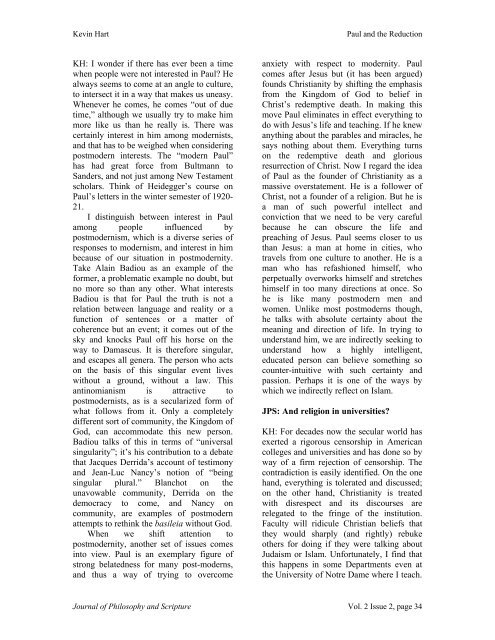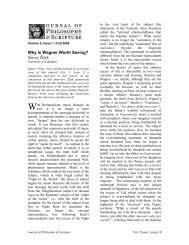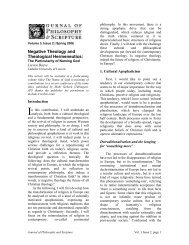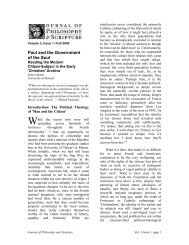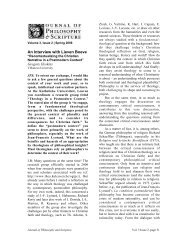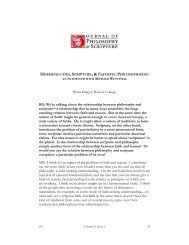An Interview with Kevin Hart - Journal of Philosophy and Scripture
An Interview with Kevin Hart - Journal of Philosophy and Scripture
An Interview with Kevin Hart - Journal of Philosophy and Scripture
You also want an ePaper? Increase the reach of your titles
YUMPU automatically turns print PDFs into web optimized ePapers that Google loves.
<strong>Kevin</strong> <strong>Hart</strong><br />
Paul <strong>and</strong> the Reduction<br />
KH: I wonder if there has ever been a time<br />
when people were not interested in Paul? He<br />
always seems to come at an angle to culture,<br />
to intersect it in a way that makes us uneasy.<br />
Whenever he comes, he comes “out <strong>of</strong> due<br />
time,” although we usually try to make him<br />
more like us than he really is. There was<br />
certainly interest in him among modernists,<br />
<strong>and</strong> that has to be weighed when considering<br />
postmodern interests. The “modern Paul”<br />
has had great force from Bultmann to<br />
S<strong>and</strong>ers, <strong>and</strong> not just among New Testament<br />
scholars. Think <strong>of</strong> Heidegger’s course on<br />
Paul’s letters in the winter semester <strong>of</strong> 1920-<br />
21.<br />
I distinguish between interest in Paul<br />
among people influenced by<br />
postmodernism, which is a diverse series <strong>of</strong><br />
responses to modernism, <strong>and</strong> interest in him<br />
because <strong>of</strong> our situation in postmodernity.<br />
Take Alain Badiou as an example <strong>of</strong> the<br />
former, a problematic example no doubt, but<br />
no more so than any other. What interests<br />
Badiou is that for Paul the truth is not a<br />
relation between language <strong>and</strong> reality or a<br />
function <strong>of</strong> sentences or a matter <strong>of</strong><br />
coherence but an event; it comes out <strong>of</strong> the<br />
sky <strong>and</strong> knocks Paul <strong>of</strong>f his horse on the<br />
way to Damascus. It is therefore singular,<br />
<strong>and</strong> escapes all genera. The person who acts<br />
on the basis <strong>of</strong> this singular event lives<br />
<strong>with</strong>out a ground, <strong>with</strong>out a law. This<br />
antinomianism is attractive to<br />
postmodernists, as is a secularized form <strong>of</strong><br />
what follows from it. Only a completely<br />
different sort <strong>of</strong> community, the Kingdom <strong>of</strong><br />
God, can accommodate this new person.<br />
Badiou talks <strong>of</strong> this in terms <strong>of</strong> “universal<br />
singularity”; it’s his contribution to a debate<br />
that Jacques Derrida’s account <strong>of</strong> testimony<br />
<strong>and</strong> Jean-Luc Nancy’s notion <strong>of</strong> “being<br />
singular plural.” Blanchot on the<br />
unavowable community, Derrida on the<br />
democracy to come, <strong>and</strong> Nancy on<br />
community, are examples <strong>of</strong> postmodern<br />
attempts to rethink the basileia <strong>with</strong>out God.<br />
When we shift attention to<br />
postmodernity, another set <strong>of</strong> issues comes<br />
into view. Paul is an exemplary figure <strong>of</strong><br />
strong belatedness for many post-moderns,<br />
<strong>and</strong> thus a way <strong>of</strong> trying to overcome<br />
anxiety <strong>with</strong> respect to modernity. Paul<br />
comes after Jesus but (it has been argued)<br />
founds Christianity by shifting the emphasis<br />
from the Kingdom <strong>of</strong> God to belief in<br />
Christ’s redemptive death. In making this<br />
move Paul eliminates in effect everything to<br />
do <strong>with</strong> Jesus’s life <strong>and</strong> teaching. If he knew<br />
anything about the parables <strong>and</strong> miracles, he<br />
says nothing about them. Everything turns<br />
on the redemptive death <strong>and</strong> glorious<br />
resurrection <strong>of</strong> Christ. Now I regard the idea<br />
<strong>of</strong> Paul as the founder <strong>of</strong> Christianity as a<br />
massive overstatement. He is a follower <strong>of</strong><br />
Christ, not a founder <strong>of</strong> a religion. But he is<br />
a man <strong>of</strong> such powerful intellect <strong>and</strong><br />
conviction that we need to be very careful<br />
because he can obscure the life <strong>and</strong><br />
preaching <strong>of</strong> Jesus. Paul seems closer to us<br />
than Jesus: a man at home in cities, who<br />
travels from one culture to another. He is a<br />
man who has refashioned himself, who<br />
perpetually overworks himself <strong>and</strong> stretches<br />
himself in too many directions at once. So<br />
he is like many postmodern men <strong>and</strong><br />
women. Unlike most postmoderns though,<br />
he talks <strong>with</strong> absolute certainty about the<br />
meaning <strong>and</strong> direction <strong>of</strong> life. In trying to<br />
underst<strong>and</strong> him, we are indirectly seeking to<br />
underst<strong>and</strong> how a highly intelligent,<br />
educated person can believe something so<br />
counter-intuitive <strong>with</strong> such certainty <strong>and</strong><br />
passion. Perhaps it is one <strong>of</strong> the ways by<br />
which we indirectly reflect on Islam.<br />
JPS: <strong>An</strong>d religion in universities?<br />
KH: For decades now the secular world has<br />
exerted a rigorous censorship in American<br />
colleges <strong>and</strong> universities <strong>and</strong> has done so by<br />
way <strong>of</strong> a firm rejection <strong>of</strong> censorship. The<br />
contradiction is easily identified. On the one<br />
h<strong>and</strong>, everything is tolerated <strong>and</strong> discussed;<br />
on the other h<strong>and</strong>, Christianity is treated<br />
<strong>with</strong> disrespect <strong>and</strong> its discourses are<br />
relegated to the fringe <strong>of</strong> the institution.<br />
Faculty will ridicule Christian beliefs that<br />
they would sharply (<strong>and</strong> rightly) rebuke<br />
others for doing if they were talking about<br />
Judaism or Islam. Unfortunately, I find that<br />
this happens in some Departments even at<br />
the University <strong>of</strong> Notre Dame where I teach.<br />
<strong>Journal</strong> <strong>of</strong> <strong>Philosophy</strong> <strong>and</strong> <strong>Scripture</strong> Vol. 2 Issue 2, page 34


